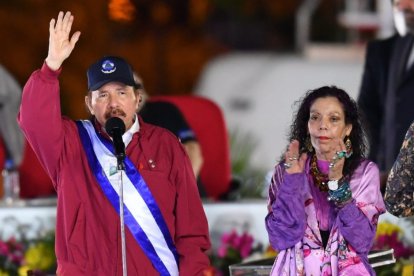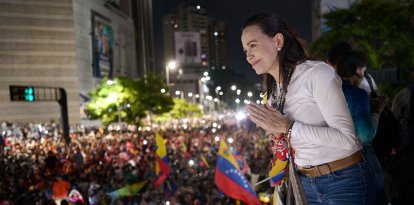Nicaragua's dictatorship benefits from remittances and the passage of illegal immigrants
Daniel Ortega's government is capitalizing off the millions of dollars that come from the passage of immigrants to the United States, as well as from the money that Nicaraguans send to their families once they have settled in that country.

Daniel Ortega and Rosario Murillo
The dictatorship of Daniel Ortega in Nicaragua has a million-dollar business with illegal immigrants crossing into the United States. This was revealed by an investigation conducted by the BBC, which showed that more and more people are deciding to travel to Nicaragua during their journey to U.S. territory.
"Those who leave from regions with no land connection, from the Caribbean to Asian or African countries, have found in Nicaragua a platform to reach the North American power. With this, they avoid crossing the feared Darién Gap, the dangerous jungle between Colombia and Panama. Only three countries, Honduras, Guatemala and Mexico, separate them from their dream of setting foot on U.S. territory," explained the BBC.
In this sense, the network detailed that the Ortega regime offers visas to the main nationalities migrating to the United States. It detailed that the intention is not only to put political pressure on Washington, but also to obtain economic benefits.
By air and land, Nicaragua as a 'toll' to the U.S.
There have also been reports of illegal flights. For example, according to the BBC, on Dec. 23, 2023, a plane from Dubai bound for Managua was intercepted during a stopover in Vatry, France, due to an anonymous report of human trafficking.
"It was carrying 303 Indian passengers who were allegedly trying to reach the Americas via Nicaragua to travel to the United States. In the end, 276 were returned to their country and 27 sought asylum in France," the BBC reported.
According to the report, the journeys have allowed the entry of at least 300,000 illegal immigrants.
"From May 2022 to May 2023, 'some 1,200 privately contracted flights landed in the Nicaraguan capital to transport passengers who went directly en route to the southern border with the United States,' as Manuel Orozco, director of the Migration, Remittances and Development program at the Inter-American Dialogue think tank, told BBC Mundo," the BBC explained.
Although the arrival of flights from Asian and African countries is striking, the truth is that the majority of migrants who have used Nicaragua as a first stop to continue their journey to the United States came from closer countries such as Cuba, Haiti and the Dominican Republic.
Last year, flights to Nicaragua were reduced. In response to the situation, Ortega "expanded his visa exemption policy and signed agreements with small airlines, such as Ghadames Air, to attract migrants of the most diverse nationalities, from Indians to Kazakhs, Uzbeks, Kyrgyz and Moroccans."
According to the report, with the flights, the dictatorship obtains economic income from at least three different sources: airport taxes, visa fees, as well as transportation and living expenses. In addition, it was learned that for those who pass through Nicaragua by land after crossing the border with Costa Rica, an undetermined number of them are charged a $150 safe-conduct fee to enter the country without a visa.
"According to the Nicaraguan media outlet Confidencial, between January and October 2023, the government allegedly received some $65.9 million in fees or fines to migrants passing through, while in the first three months of 2024, the figure reportedly reached $8.4 million," highlighted BBC.
Although these are the figures offered by the sources consulted by the BBC, it was indicated that "it is believed that the benefits for the Nicaraguan government are much greater."
In addition to the economic benefits, Nicaragua is also trying to gain a tool that will allow it to negotiate in the future with the United States.
"It believes that, by controlling this major illegal migrant inflow valve, Ortega has an ace up his sleeve for future negotiations on bilateral issues with Washington," the BBC said.
Remittances, Ortega's lifeline
This is not Ortega's only source of income. The dictatorship is also sustained by remittances from people who emigrated due to the political crisis. Data from the Central Bank of Nicaragua indicate that in June 2023 alone, "$2.215 billion were received, 58.6% more than in the same period of 2022 ($1.396 billion)."
The main countries of origin of remittances received in the quarter continued to be: the United States with 83.2% of the total, followed by Costa Rica (6.6%) and Spain (5.6%). These three countries account for 95.4% of the total received.
"Paradoxically, of the $2.215 billion received in remittances up to June 2023, $1.818 billion came from the United States, the nation against which Ortega and his entourage constantly lash out," indicated an investigation by Nicaragua Investiga.
A report by the International Organization for Migration (IOM), an institution associated with the United Nations (U.N.), revealed that the United States continues to be the leading country in sending remittances abroad. In 2022, the latest year for which data is available, workers sent a total of $79.15 billion to their families or relatives living in their countries of origin or in other territories.
This situation has allowed dictatorships in countries such as Nicaragua or Venezuela to benefit because they give respite to these economies. This was explained in a report by The Wall Street Journal.
"But the remittances also provide critical support to fragile states and autocratic regimes which rely on money earned by their citizens abroad to keep their economies afloat. ... Remittances to the developing world hit record $647 billion, aiding the poor but helping keep strongmen from Nicaragua to Tajikistan in power," according to a piece by The Wall Street Journal.
RECOMMENDATION
























